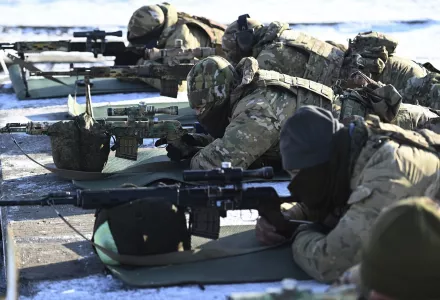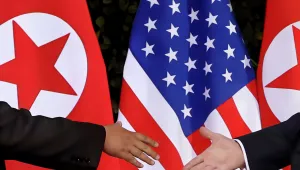Brig. Gen. Kevin Ryan (U.S. Army, retd.) is a Belfer Center Senior Fellow and served as the founder and Director of the Defense and Intelligence Projects until his retirement in 2017. A career military officer, he served in air and missile defense, intelligence, and political-military policy areas. From 1995 to 1996, he was head of the Moscow office of the POW/MIA Commission, searching for missing Americans in the former Soviet states. From 1998 to 2000, he served as Senior Regional Director for Slavic States in the Office of Secretary of Defense and, from 2001 to 2003, as Defense Attaché to Russia. He has commanded at every level from platoon to brigade and served in Europe, Korea, and Iraq. In his last duty assignment he was responsible for Army Strategic War Plans, Policy, and International Affairs and coordinated Army policy in the domestic interagency and with foreign allies.
Ryan holds a Bachelor of Science degree from the U.S. Military Academy, a Masters degree in Russian Language and Literature from Syracuse University and, a Masters degree in National Security Strategy from the National War College. Ryan has been a fellow at Harvard Kennedy School’s Shorenstein Center on Press, Politics and Public Policy and was Vice President for Business Development at iRobot Corporation. He is a member of the Board of the American Councils for International Education (ACTR/ ACCELS) and a member of the Belfer Center Board of Directors. He was previously Executive Director for Research of the Belfer Center from 2010 to 2013. He is the author of over 20 articles and book chapters on various leadership and security topics. Ryan was the founding director of the center’s U.S.-Russia Initiative to Prevent Nuclear Terrorism, where he also founded the Elbe Group (retired US and Russian flag officers from the military and intelligence fields).
Dr. Alexandra Vacroux is Executive Director of the Davis Center for Russian and Eurasian Studies and Lecturer on Government at Harvard University. Her scholarly work addresses many Russian and Eurasian policy issues. In addition, she teaches popular courses on the comparative politics of Eurasia and post-Soviet conflict. She has mentored dozens of Harvard’s best and brightest Russian regional studies students and scholars. She is an active member of the bilateral Working Group on the Future of U.S.–Russia Relations, and co-chairs the Davis Center's long-running Comparative Politics Seminar.
Prior to joining the Davis Center in 2010, Alexandra held a variety of scholarly and business positions in the American and Russian capitals. In Washington, DC, she was a Scholar at the Kennan Institute (Woodrow Wilson International Center for Scholars). While living in Moscow for more than a decade in the 1990s, she was consultant to the Russian Privatization Agency, President of the American brokerage for the Brunswick Warburg investment bank, and member of the board of United Way Moscow. She also served as research associate at the Center for Economic and Financial Research (CEFIR), a Russian think tank associated with the New Economic School. She is recipient of a Dean’s Distinction Award from Harvard’s Faculty of Arts and Sciences, and of the Alumni Award from the Education for Public Inquiry and International Citizenship (EPIIC) Program at Tufts. She holds a Ph.D. in Government from Harvard University.
David E. Sanger is a White House and national security correspondent and a senior writer at The New York Times, a CNN national security contributor, and an adjunct lecturer at the Harvard Kennedy School. In a four-decade-long reporting career for The New York Times, he has been on three teams that have won Pulitzer Prizes, most recently in 2017 for international reporting. His newest book, The Perfect Weapon: War, Sabotage and Fear in the Cyber Age, and an Emmy-nominated HBO documentary by the same title, examine the emergence of cyberconflict and its role in changing the nature of global power.
He is also the author of two Times best sellers on foreign policy and national security: The Inheritance: The World Obama Confronts and the Challenges to American Power, published in 2009, and Confront and Conceal: Obama’s Secret Wars and Surprising Use of American Power, published in 2012. For The Times, Mr. Sanger has served as Tokyo bureau chief, Washington economic correspondent, White House correspondent during the Clinton and Bush administrations, and chief Washington correspondent. Returning to Washington, Mr. Sanger turned to a wide range of diplomatic and national security issues, from nuclear proliferation to the rise of cyberconflict among nations. Mr. Sanger was a leading member of the team that investigated the causes of the Challenger disaster in 1986, which was awarded a Pulitzer in national reporting the following year. His journalistic pursuit of the origins of Stuxnet became the subject of the documentary “Zero Days,” which made the short list of Academy Award documentaries in 2016.
A 1982 graduate of Harvard College, Mr. Sanger was the first senior fellow in The Press and National Security at the Belfer Center for Science and International Affairs at Harvard's Kennedy School. With Graham T. Allison Jr., he co-teaches “Central Challenges in American National Security, Strategy and the Press” at the Kennedy School of Government.



